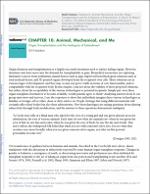Chapter 10 Animal, Mechanical, and Me
Organ Transplantation and the Ambiguity of Embodiment
Abstract
Organ donation and transplantation is a largely successful treatment used to replace failing organs. However, donation rates have never met the demand for transplantable organs. Biomedical researchers are exploring alternative sources from nonhuman animal donors such as pigs; improved biotechnological solutions such as total artificial hearts; and 3D printed organs developed from the recipient’s own cells. These These solutions are in various stages of development, and they may or may not prove viable in terms of cost, functionality, and/or compatibility with the recipient’s body. In this chapter, I ask not about the viability of these proposed solutions, but rather, about the acceptability of the various technologies to potential recipients. Simply put: were these organ transplant alternatives to become available, would patients agree to them? Analyzing answers from focus group interviews and surveys, I use the responses to show that individuals imagine these various technologies as familiar or foreign, self or other, clean or dirty, and so on. People envisage that using different different different materials will certainly affect their bodies but also their subjectivities. New biotechnologies are raising questions about altering subjectivity through body modification and the answers to these questions demonstrate ambiguity.
Keywords
organ transplantation; organ donation; nonhuman animal donorsISBN
978019084275Publisher
Oxford University PressPublisher website
https://global.oup.com/Publication date and place
Oxford, 2019Grantor
Classification
Medical and health informatics


 Download
Download